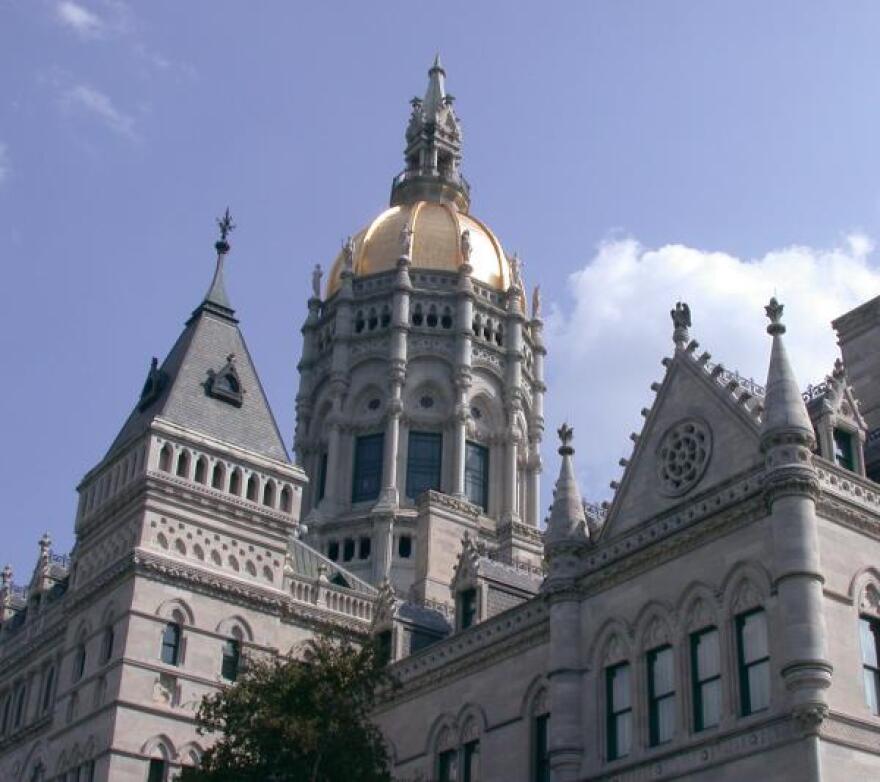A former Connecticut congressional candidate has admitted to painting pink stripes on the doors of the state Capitol building.
Before heading to Hartford on Friday, Kevin Blacker was charged in 2020 with criminal mischief for painting signs at State Pier in protest of redeveloping New London into a hub for the offshore wind industry.
WSHU’s Brian Scott-Smith spoke with Blacker, who has criticized the Connecticut Port Authority’s mishandling of the State Pier in New London, which is unfinished and over-budget. He acknowledges he is being questioned by police.
WSHU: Kevin, you have and continue to be an outspoken critic of the Connecticut Port Authority. In the media Monday, there’s an article about some activity that you undertook on the state Capitol last week. Just explain what that was and why you felt compelled to do it.
KB: So, I drove up to the state Capitol, walked up to the front doors, and I painted four pink stripes on the front doors of the state Capitol. I felt compelled to do it. Because there's a serious problem that is being covered up and overlooked in our state government.
WSHU: This isn't the first time you've painted and used pink paint? Just quickly explain, what's the relevance of the pink because you've clearly chosen it for a reason.
KB: It's a reference to the government abuses down at Fort Trumbull, where the government, you know, took a lot of property by eminent domain. It was just a total government abuse, government overreach. And I see similarities in what's happening at State Pier in New London.
(The pink paint is a reference to the 2005 Supreme Court case Kelo v. City of New London, where the state seized the famous Little Pink House and led to sweeping reforms of eminent domain laws nationwide.)
WSHU: So take us through this. You went there. You painted these stripes on the Capitol building. You were observed by Capitol Police, but nothing seems to happen. Explain that a bit more.
KB: Yes. So I walked up. I was wearing a reflective vest. I wanted to make sure that everybody knew I wasn't trying to hide; I wasn't trying to get away with what I was doing.
Maybe 30 feet from the building, a police officer walked out. He looked at me, walked over to his cruiser over there. I could hear him kind of horsing around, you know, while I was painting, and I was just kind of dumbfounded that I could be painting the front doors of the Capitol and have nobody come out from inside, and have a police officer not do anything to stop me. I turned and walked away. I use the crosswalk. I walked back to my truck.
The whole time I was thinking, you know, certainly somebody's going to stop me. But no, nobody did. And they have video. So I look forward to them releasing it. And then everybody can see.
WSHU: How long would you say this whole process took? [...] It sort of does draw some worrying concerns about security at the Capitol.
KB: Well, I mean, of course, because the question that I'll ask — it's a question that most people wouldn't ask is — what if rather than carrying a can of paint, I was carrying a gun? I'd never, you know, carry a gun up to the state Capitol — but everybody knows there are plenty of people that would.
So, you always have to be on guard and diligent. And, you know, clearly there was some error.
How long did it take? Again, you'd have to refer to the video because when you're doing something that gets your adrenaline up so much, you know, your perception of time changes. So I don't know that I could accurately answer that question.
WSHU: Some will be sympathetic towards your cause, and some people will say you've defaced government property. What's your reaction?
KB: Anybody that knows me, or that has followed the State Pier, or the work that I've done knows that there is nothing more that I could have done, they know I've worked for five years on this. I have written thousands of emails, dozens of op-eds, attended hearings, ran for Congress. I mean, I’ve done everything that I could within the rules.
And when that doesn’t suffice then you go outside of the rules. Cause the Capitol and the government has made it clear the laws don’t apply up there. They’ve broken — they’ve violated antitrust laws, illegal hiring, skipping meetings, trampled all over and violated [freedom of information] laws. So, they’re not following the laws. So, I’m not going to either.
I want to make it real clear that I'm not willing to pay to fix those doors. If the governor and the government and the legislature wants those doors repaired, they can just tack it onto the next cost overrun down at State Pier because it's already been $100 million over [...] So, what’s the cost of those doors on top of it?


